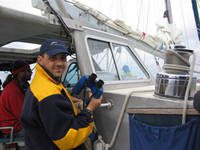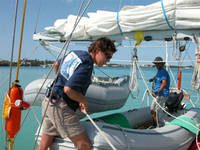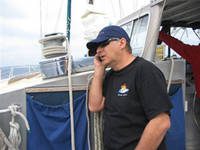May 16, 2005
Back on deck. Monday, May 16th, 2005
Last Saturday, April 3, it was three months and a half since I went ashore from the Ranger in Fort Lauderdale (Florida), when the catamaran ended its first leg of the passage through waters of the Pacific in Central America and West Caribbean. That marked the start of a period of maintenance repairs to the Ranger, to prepare for its next crossing through the Atlantic, towards European and African seas. I came back to the ship two days ago, in Bermudas, after an 11 hour flight from Madrid via London, accompanied by Alicia Fraile and Guayo de Ana and after carrying out long and burdensome immigration errands. We relieve Ricardo Aguilar and Paloma Larena, who have lead and reported, respectively, the Oceana crew members throughout the last few weeks while in Florida, Bahamas and in the south of the Sargasso Sea.

Now we have been sailing for twenty four hours since we left Saint George Harbor, with an extended sea ahead of us and long rolling wave movement, but practically still water. The next firm land we see, if everything goes well, will be the Portuguese islands of Azores in two weeks time. The Atlantic has been treating us well, for the moment, although the most experienced seafaring members onboard would prefer more excitement. It feels good to be on deck once more, “on the road again”.
The time spent without much to do except to keep the ship tidy and safely sailing or helping around with routine chores everyone is assigned to, allows us to reflect on those things that occupied our time during the last hectic period spent on land-and in the air.

Although the Ranger’s expedition through various seas is one of Oceana’s main projects, the truth is hat many other things occur simultaneously in other fronts of the organization. In fact, since our ship left Los Angeles in January, those or our companions who continue working from their desks won a major achievement when the United States government banned bottom trawling practices in practically all waters around Alaska, an area covering one million square meters, comparable to the size of China. The governor of California, Arnold Schwarzenegger has implemented similar prohibition in the waters under his jurisdiction, while at the same he has implemented strict regulations against contamination from cruise ships operating in his state. Democrat representatives have also introduced a bill in Congress that, if approved, would make it mandatory for all cruise ships, these floating urban centers, to implement water treatment systems, following similar measures implemented on Royal Caribbean cruise ships after Oceana advocated and achieved such results.
On the other side of the Atlantic, the European Parliament has approved-almost unanimously- the proposal advocated by Oceana to make voluntary or negligent oil discharges into the ocean be considered a criminal act and violations would not only be penalized with millionaire fines but with prison terms for captains and shipowners or proprietors of ships found guilty of violations. Even insurance companies that protect those companies would be implicated. We must not forget that those rutinary spills-produced during ballast removal operations or during bilge or sesspit cleaning-represent three times, or more, the annual number of all oil spill incidents like those of the Prestige, Erika or the Exxon Valdez.

On other levels, last April, Oceana organized a two -day International Symposium on the Oceans, which gathered some of the most eminent specialists on the sea from around the world. It was inaugurated by UNESCO’s former director, Federico Mayor Zaragoza and the closing remarks were delivered by the Executive Director of the United Nations Environmental Program (UNEP), and the former German minister Klaus Toepfer. In support of Bettina Alonso, who organized this event on our behalf, I had to exchange my waterproof clothing and my life jacket, for the appropriate suit and tie to represent Oceana in the symposium.
In Madrid, I met with congress representatives from different political parties to collaborate in the preparation of initiatives to present in Parliament, and try to influence the Government positions on fishing. The many progressive initiatives from the Zapatero administration on the social and economic fronts do not move at all to the side of fisheries issues. The powerful lobby carried out by Spanish shipowners continues to hold a powerful control on these issues. Whether under dictatorship, democracy, under UCD, PSOE or PP administration, it is the same. This is how, without batting an eye, the Director General of Fishing Resources Fernando Curzio, from the National Congress on the Environment answered to a question from an assistant: “I have to say to whomever asked this question, that in regards to fisheries issues, the government policy of the PSOE is the same as it was under the PP”. And that was that.
These have been intense weeks of contacts with other organizations and gathering data to prepare the next phase of the Ranger expedition, in addition to preparation of reports on results obtained and future projects. But we will leave these details for some other day. Now, I must be on deck again.

